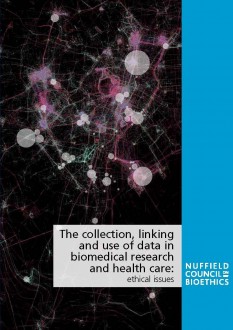Blog post
Biological and health data: 8 months on
The Council’s report on the impact of big data technologies on privacy, public interest and how these are conceptualised was published in February 2015.

Electronic health records, genome sequencing, clinical trial data, body and brain scans, lifestyle information collected on apps and other ‘self-quantifying’ tools appear to create a tantalising variety of data promising to paint a much more complete picture of population and individual health. The opportunities this might offer for a wider evidence base and better healthcare have long been a focus in the UK’s national research strategy with a notable track-record of population studies, and later the development of UK Biobank. While our report was being written up, the 100,000 Genomes project took off, and in the healthcare sector the care.data project made headlines on an almost weekly basis.
Our report was shaped against the background of this very dynamic new field of ‘data ethics’, and we tried to outline an adequately broad horizon against which some key features of what came to be called ‘data initiatives’ in the report with their focus on re-use and data linkage can be assessed in ethical terms.
Since the launch of the report, we have talked to many others working on big data initiatives in biomedical research and healthcare, including government departments and agencies, the BMA and the Wellcome Trust amongst others, and have looked for ways of putting our recommendations into practice. The issues that are pertinent now revolve, for example, around the trustworthiness of data-holding institutions particularly as these increasingly share data with third parties, be they academic researchers, administrative bodies, or commercial companies.
In June, the Council hosted a roundtable discussion meeting with the UK Department of Health and others on the latter subject (a detailed note is available online). This, we hope, might be followed by a second meeting, in which issues around the practical implementation in NHS data systems can come increasingly clearly into focus.
We also know that the report is feeding into the development of data governance, most notably at the Department of Health, where the National Information Board’s roadmap for building sustainable public trust in health data use included the meeting as the starting point for its work stream in this area.
Dame Fiona Caldicott, who attended the roundtable, last month set out her priorities as National Data Guardian – underlining a strong commitment to public dialogue that she tied to our report, which had made it clear that “there is an essential requirement to engage in such a dialogue, before embarking on major projects to gather and share data.” The Council will follow these developments with great interest and respond to Dame Fiona’s current consultation on her role and the functions of the National Data Guardian for health and social care.
The Council submitted a response to the House of Commons Science and Technology Select Committee inquiry on big data; and our Chair Professor Jonathan Montgomery will be giving oral evidence to the Committee in November.
Council staff are also advising on a citizens’ jury project to address questions of patient control and access of patient records, which will be held at the University of Manchester next January.
Members of the Working Party and Council staff have spread the word at public events, conferences and workshops, for example at the Oxford Internet Institute, The Royal Society, the Cheltenham Science Festival and the Centre for Health, Law and Emerging Technologies (HeLEX).
At a European level, we have followed in particular the development of the General Data Protection Regulation (GDPR) and issued a statement in June which supports the use of broad consent in research that is well governed and builds on the idea that consent, or very specific consent, is often not the answer to the challenges in big biomedical data. Later this month, the report will be discussed in a panel on privacy and healthcare at the Amsterdam Privacy Conference.
A number of international organisations, such as the World Medical Association, are updating their guidelines on similar issues, and so we've had the chance to contribute to the call for comments on the Declaration on Ethical Considerations regarding Databases and Biobanks, (see our comments here), as well as on the Global Alliance consent policy.
Many themes of the report will be taken up in future meetings with policy bodies or in events at the Council, and we look forward to continued discussion on where the focus around privacy and big data in health, research, and beyond should lie. In addition to the themes that have emerged concerning trust in the public use of data and third party use of data, in particular commercial use, another theme under discussion we will follow up concerns penalties for deliberate misuse of data.
If you would like any further information on our work in this area, or suggest topics for further engagement around the ethics and governance of biomedical and health data, please contact Bettina Schmietow at bschmietow@nuffieldbioethics.org.
Comments (0)
Join the conversation